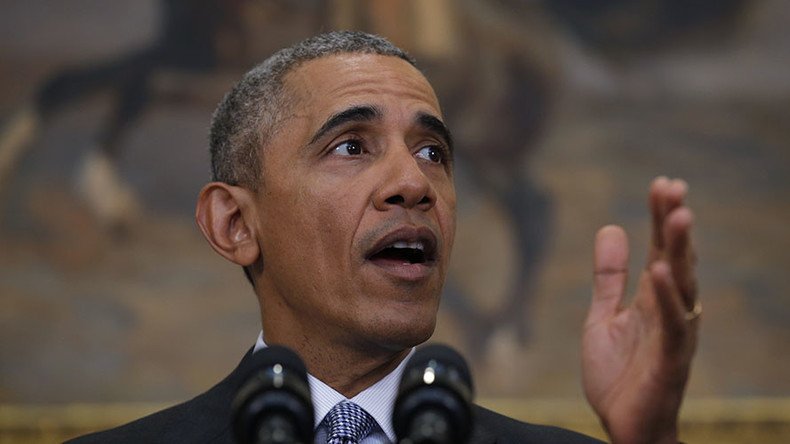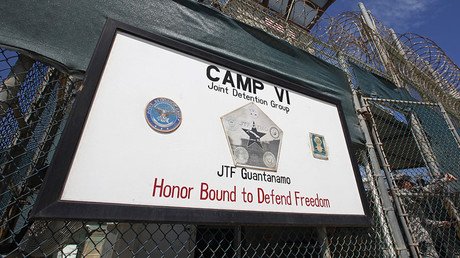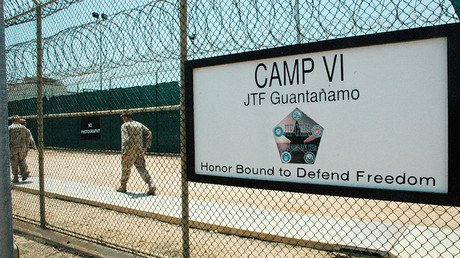Obama’s plan to close Gitmo panned by Republicans, civil rights activists

Republicans in Congress wasted no time on Tuesday in opposing President Barack Obama’s new plan to close the Guantanamo Bay military detention facility, with even some who have previously supported the move lacking enthusiasm for the proposal.
“I am clear-eyed about the hurdle of closing Guantanamo. The politics of this are tough,” President Obama acknowledged at a White House press briefing on Tuesday, saying that his 9-page plan “deserves a fair hearing.”
At about the same time, however, Republican legislators were announcing their own bills, seeking to disrupt some of the president’s recommendations.
Representative Ed Royce (R-California), as chairman of the House Foreign Affairs Committee, proposed legislation requiring transparency in the Guantanamo detainee transfer process, opening it up to more scrutiny and obstruction.
“This legislation will bring much needed public scrutiny to the administration’s mad rush to transfer detainees out of Guantanamo Bay before President Obama leaves office,” Royce said in a statement.
Republicans in the Senate were attacking the plan even before the White House formally presented it.
Senators Richard Burr (R-North Carolina), Kelly Ayotte (R-New Hampshire), Tom Cotton (R-Arkansas), and presidential candidate Senator Marco Rubio (R-Florida) joined forces on Monday night to present a bill blocking any executive moves to return the Guantanamo Bay naval base to the Cuban government without congressional authorization.
“It’s clear that the threats to the United States are increasing, not decreasing, and we need every available military asset. As President Obama continues to court the Castro regime, I believe it is important that Congress makes clear that he cannot give up our base in such a strategic location,” said Burr, chairman of the Senate Intelligence Committee.
A companion bill in the House was introduced by another Republican, Representative David Jolly of Florida.
Other Republican lawmakers refused to give the White House’s proposal much credibility.
“What the president submitted today is more press release than a plan,” Representative Mac Thornberry (R-Texas), chairman of the House Armed Services Committee, said.
Similarly, Senator John McCain (R-Arizona), chairman of the Senate Armed Services Committee, called the plan “a vague menu of options” and not a “coherent policy to deal with future terrorist detainees.”
“We can say now with confidence that the president has missed a major chance to convince the Congress and the American people that he has a responsible plan to close the Guantanamo Bay detention facility,” McCain added.
McCain has long supported the idea of closing the facility, also known as Gitmo, but has been frustrated with perceived stalling from the Pentagon and White House. McCain was instrumental in Tuesday’s White House announcement, as he helped include the deadline requiring the president to submit a plan for Guantanamo to Congress in the recently passed National Defense Authorization Act, which funded the military.
The timing of the deadline, however, may have proved problematic. Congress is only a few weeks away from hearing testimony on a recidivism report from the Office of the Director of National Intelligence that will reveal which former Gitmo detainees have returned to combat roles against the US – usually a source of talking points for those against closing the facility.
Still another voice in opposition to Obama’s plan echoing McCain and other Republicans came not from a right-leaning organization, but the Center for Constitutional Rights, which provides lawyers for dozens of current Gitmo detainees.
“This is not a plan to close Guantanamo,” the Center said in its statement. “The centerpiece of the plan – moving those detainees who have not been and will never be charged with any crime to a prison in the US – does not ‘close Guantanamo,’ it merely relocates it to a new zip code.”
Lawmakers supporting Obama’s plan have not spoken out as emphatically, but one of the president’s allies, Senator Dianne Feinstein (D-California), urged her colleagues to embrace the fiscal aspects of closing down the war-on-terror prison.
“This prison is a waste of taxpayer dollars – more than $5 billion to date – and stands in contrast to our values as a nation,” Senator Feinstein said in a statement.
US government fights to keep ‘disturbing’ force-feeding Gitmo footage secrethttps://t.co/aSy9l88FxIpic.twitter.com/Zb05qLruY9
— RT America (@RT_America) January 22, 2016
White House estimates boast that the $445 million the government currently spends annually to run Gitmo will be reduced by between $140 million and $180 per year by implementing the president’s plan. While the transition could cost up to $475 million up front, the status quo brings even more costs, the White House argues, including $200 million in retrofitting construction costs incurred in this year alone.
While Obama promoted the financial impact of his plan, his more flourishing rhetoric was focused on the country’s legacy, as well as his own.
“This is about closing a chapter in our history,” Obama said on Tuesday. “It reflects the lessons that we’ve learned since 9/11, lessons that need to guide our nation going forward.”
Guantanamo still houses 91 detainees, 35 of whom have been cleared for transfer to third-party nations. The White House expects to have those moved out before the end of the summer.













